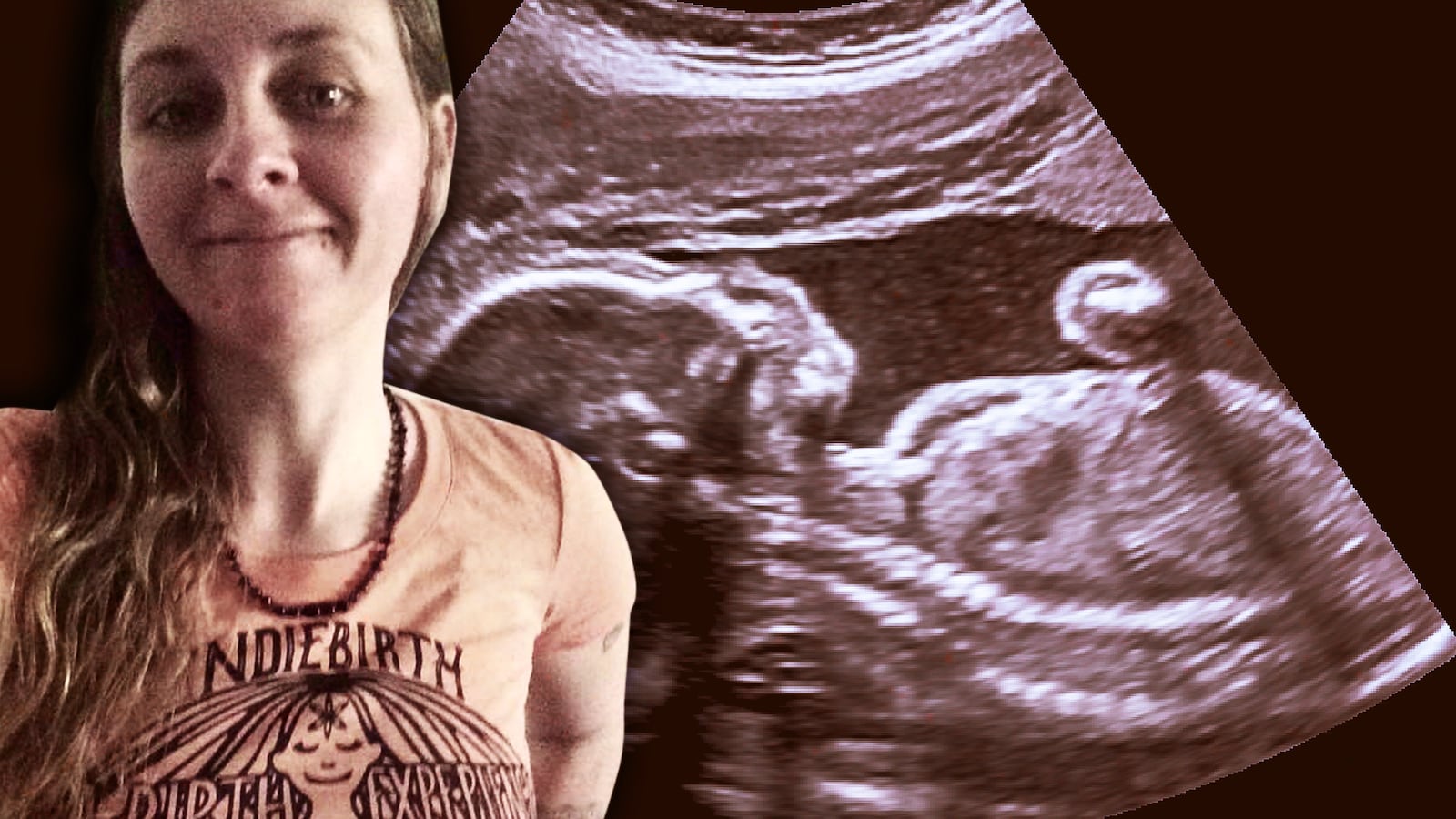They claim to work above the law. Meanwhile, two of their clients’ newborns are six feet under.
Within a month of each other, two infants in Nebraska and Indiana died during home births performed by unlicensed midwives, officials in those states allege. Both midwives presented themselves as members of “private membership associations”—groups they claimed allowed them to practice midwifery independent of laws and medical regulations.
PMAs aren’t a real legal entity. They’re a conspiracy-flavored creation that has nonetheless drawn a wide circle of unlicensed birth assistants and expectant parents seeking an alternative to expensive hospital births.
But sometimes the cost is the baby’s life.
On June 15, Omaha Fire Department medics arrived at a home to find an unlicensed midwife holding a half-delivered baby. The baby was coming out feet first, a dangerous delivery method. The midwife, Angela Hock, allegedly told the mother she was trained in delivering babies in this position.
In reality, prosecutors say, Hock wasn’t trained at all. Instead, she allegedly charged the mother between $3,000 and $4,000 to deliver the baby at home, in violation of Nebraska law. The baby was cut off from oxygen during the delivery, and died two days later. A licensed obstetrician testified that the baby could have survived with appropriate medical care.
Hock, who has been charged with child abuse for her alleged role in the death, offered her services through a PMA. On her website, Hock described PMA members as “enjoy[ing] a general immunity to public laws, regulations, and internal rules of local, state, and federal administrative agencies (including, but not limited to, the FDA) that protect the public health.”
In other words, Hock claimed her practice was exempt from health laws. A legal free pass might be appealing to some birth professionals. Midwife laws and accreditation requirements vary from state to state and are even vaguer for other professionals like doulas, who are not medically licensed but provide support during birth. The ambiguity, and the reluctance of some midwives to obtain accreditation, has led to a long-running phenomenon of unlicensed midwives.
Some expectant parents might not know the difference between licensed and unlicensed midwives and doulas. And others, attempting to avoid prohibitively expensive hospital bills, might opt for a cheaper home birth, even if the midwife is not certified.
A month before the Nebraska baby’s death, a similar tragedy played out in Indiana. Julie Lentz, another unlicensed midwife, allegedly advised a client to stay home 10 days after her water broke, according to court records. Lentz allegedly gave the mother conflicting information, telling her the baby was in breach (feet-first) position, then changing her mind multiple times. The mother contracted a fever and told her husband she wanted to go to the hospital. Lentz allegedly talked them out of the trip. When Lentz finally called the hospital, she is said to have told paramedics that her client’s water had broken within the past 24 hours (in reality, it was more than 10 days earlier), and that the mother and baby’s vitals were stable.
Actual doctors quickly concluded the baby had died, and that the mother had a life-threatening infection. Lentz was forbidden from working as a midwife, and prosecutors are reportedly considering whether to press charges against her.
Lentz also operated under a PMA, which she allegedly presented as shielding her from regulations. “Lentz claims that within the PMA, the midwife-client relationship is a private transaction that is outside the scope of public laws,” a temporary restraining order in her case reads.
The fake legal claims derive from the sovereign citizen movement, said JJ MacNab, an expert on anti-government extremism.
“It’s all phony legal theory. There’s nothing real there. If you look at the history of the sovereign and tax-protest movements, this is just a rehashing of an earlier scheme called the ‘pure trust.’ They just repackaged it,” MacNab, a fellow at George Washington University's Program on Extremism, told The Daily Beast. “It comes up over and over again. Sometimes it’s repackaged as ‘common-law trust.’ Right now they’re calling it ‘PMAs.’”
The sovereign citizen movement is a loosely organized, conspiracy-laden scene of people who believe themselves liberated from much or all of U.S. law. Adherents might believe that legal authority extends no further than their local sheriff, or that they’re exempt from taxes, or that most court proceedings are fake. Many use elaborate documents or “contracts” that they claim override laws.
“If you can show you have a private contract between two individuals, it’s your constitutional right to honor that contract regardless of state, federal, or local law, is what it boils down to,” MacNab explained of the theory. “You’ll find these PMAs, or pure trusts or whatever they’re calling them, in all walks of life where people are fighting regulation, whether it’s midwives or organic farms.”
Other dubiously regulated industries have also turned to PMAs for a shroud of legal protection. The Camel Milk Association requires buyers to join its PMA before purchasing raw camel milk. “My activities within the Association are a private matter that I refuse to share with the FDA, FTC, State Milk Board(s), USDA, Agricultural Board(s) State Medical Board(s) and any other without my expressed specific permission,” the camel milk company’s PMA agreement reads.
A company hawking “organic sulfur” as an anti-aging miracle outlines the scheme in conspiratorial terms:
“If you know anything about alternative medicine, you know that the AMA, FDA, FTC and the pharmaceutical companies make life difficult for anyone who tries to manufacture, promote or sell anything, that actually helps people get well,” the company writes on its website. “They make so many laws that restrict what supplement manufacturers can do or say, that most supplements don’t really do that much. We want to offer products that work extremely well, to actually fix numerous health problems.”
The company concludes that, under a mandatory PMA for buyers, the First and 14th Amendments protect the right to advertise and sell sulfur as they see fit. A raw pet-food company, a whole web of “new medicine” practices, and something called “Bi02 Energy Zone” also run PMAs.
The sovereign citizen movement pitches PMAs and similar schemes “to extremely desperate people who don’t have to be true believers when they buy into this,” MacNab said. Often, people only become full-blown sovereign citizens after the scheme fails, and they become convinced that a larger government plot is working against them.
The unlicensed midwives pushing PMAs might not even know what the sovereign citizen movement is, but the PMAs suggest that “you can keep birthing babies even though the state’s trying to shut you down,” MacNab said.
A web search for “Private Membership Association” returns more hits for midwives than perhaps any other industry. Some midwife hubs even promote PMAs as a solution for their unlicensed followings.
Lentz’s PMA network included at least one other unlicensed Indiana midwife, court records show. That midwife, Rachael Van Sickle, has also received a cease-and-desist order to stop practicing. Both women were listed as directors of the PMA. Though she did not return a request for comment, Van Sickle emphasized on Facebook that she works alone, and was not involved in the deadly birth in May.
On a doula website (where she also advertised herself as a midwife), Van Sickle said she received her “certified holistic doula” accreditation from a midwife group that also offers certification via correspondence course. On a tab on her website, she linked to a video the group made in 2015, in which they discussed “a multi-sensual, multi-dimensional way that allows us to practice freely according to our conscience,” but outside the “scrutiny from the federal and state jurisdiction and the licensing regulations.”
The solution was a PMA.







